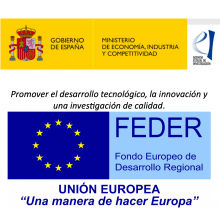Projects at a Glance
Unidad de Excelencia María de Maeztu 2016
Unidad de Excelencia María de Maeztu 2016
FUNMOLDEV - Functional Molecular Nanostructures for Optoelectronic Devices
This is a collaborative research project funded by the Spanish Ministry of Innovation and Economy (Mineco) for developing hierarchical routes for the synthesis of complex covalent molecular nanostructures with potential functionality as active optoelectronic components, such as pn junctions of quantum dots. Furthermore, FunMolDev targeted a new generation of nanodevices with disruptive impact in Information and Communication Technologies (ICT). For this purpose, we developed methods for connecting active molecular components to electrical leads and further networking them into a percolating mesh as a proof of their scalability into devices. FunMolDev also aimed at bridging such highly interdisciplinary fundamental research into higher level of technology by developing alternative routes for the synthesis and transfer of CMNs to insulting and gateable surfaces, which to date remain big challenges to the scientific community. FunMolDev combineed the work of six Spanish research groups in Galicia (CiQUS at the University of Santiago de Compostela), Euskadi (the CFM, Centro de Física de Materiales - CSIC-UPV, and CIC nanoGUNE), Aragón (the ICMA, Instituto de Ciencia de Materiales de Aragón – CSIC-UZ), and Catalunya (the ICN2, Instituto Catalán de Nanociencia y Nanotecnología).
NanoMech - Controling the nanomechanic os viral and bacterial infections: from molecules to cells
In this project we investigated the mechanical properties of proteins associated with the adhesion of bacteria and viruses in the initial moments of infection. In addition, molecular tools were developed to control said mechanics and prevent the adhesion of proteins to their targets.
HYCOM - Design of Multifunctional Hybrid Composites
The main objective of this project is to create and optimize highly functional materials using thin film growth techniques for hybrid materials and the infiltration of inorganics into polymers. These growth processes will be applied to technical products like polymer fibers or particles, with the aim of demonstrating their potential applications in various fields such as fiber-based (wearable) electronics, catalysis, and energy storage. With these advanced techniques, we aim to achieve precise control over material fabrication and the tuning of their physical properties, which are of significant interest in both technological and societal contexts.
ProteinFriction - Internal friction in protein folding, function and aggregation
Proteins serve varied functions in organisms, folding into functional structures based on energy landscapes. Protein folding landscapes are smooth yet slightly rough due to internal interactions, termed "internal friction." Misfolding, seen in diseases like Alzheimer's, lacks evolutionary pressure, resulting in rough landscapes. Recent research confirms slower diffusion in misfolding. Exploiting this, a therapeutic approach is proposed to target misfolding diseases by increasing internal friction. The project aims to understand mechanisms of internal friction, study rough misfolding landscapes, introduce mutations, and explore chemical interventions for novel disease treatment.
METAFRUMAG - NOVEL NANOSTRUCTURED METAMATERIALS WITH CONTROL OF MAGNETIC FRUSTRATION FOR APPLICATIONS TO DIGITAL AND ELECTRONIC TECHNOLOGIES
Nanomagnet logic is a computational technology combining data storage and processing using magnetic phenomena at the nanoscale. This project explored the use of magnetic metamaterials with geometrically induced magnetic frustration for novel nanomagnet logic devices.
ADVASPEC - Advanced infrared near- and far-field imaging and spectroscopy tools
The project aims to develop advanced microscopy and spectroscopy techniques for nanoscale characterization of materials and photonic devices. We will use s-SNOM and nano-FTIR to overcome diffraction limitations, enabling high-resolution imaging and spectroscopy. The research will focus on studying infrared antenna structures, leading to the development of novel infrared sensors and spectroscopy tools.
INTERFACING - Control of interfaces for advanced physical phenomena and electronic devices
The trend of miniaturization in electronic devices is making the interface between different materials increasingly more important. The interfaces are at the core of the performance of almost any nanoelectronic device, creating new physical phenomena that offer unexplored technological potential. This project aims to understand and control interfaces for advanced physical phenomena and electronic devices. The project is divided into three sections: interfaces for spintronics, metal/molecular interfaces, and 2D/molecular interfaces.
SIESTA - SIESTA for the Theory of Instabilities and Transport in Functional and Low-Dimensional Materials
The project involved a consortium of five institutions for the development of the SIESTA program for efficient first-principles calculations based on density-functional theory. New important features were incorporated (such as spin-orbit coupling, multiple-lead ballistic transport, and time-dependent DFT with moving nuclei), and used in 2D and topological materials. In Nanogune special effort was done in the simulation of strongly non-equilibrium electronic processes induced by swift nuclei projectiles.
SIESTA-PRO: Spanish Initiative for Electronic Simulations with Thousands of Atoms: Código Abierto Con Garantía y Soporte Profesional
The aim of SIESTA-PRO is taking the open-source SIESTA program (a program for the first-principles simulation of matter and materials) to high standards of competitiveness in international industrial scene. It is a collaboration led by Simune Atomistics Ltd, a company offering simulation services to high-tech industry, with three research institutions as partners. The research groups will develop new key strategic features into SIESTA, while Simune will develop tools to increase its usability in industrial environments.
By funding program
Contacto

Yurdana Castelruiz
Projects Manager
+ 34 943574022
y.castelruiz[at]nanogune.eu

